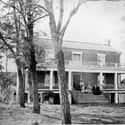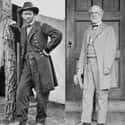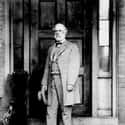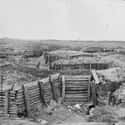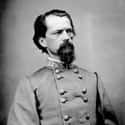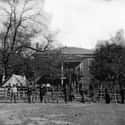-
(#11) 'We Walked In Softly... Very Much As People Enter A Sick-Chamber When They Expect To Find The Patient Dangerously Ill'
Grant and Lee met to discuss terms in the McLean home. After speaking alone, Grant's officers entered the room.
General Horace Porter described how it felt to walk into the small room: "We entered, and found General Grant sitting at a marble-topped table in the center of the room, and Lee sitting beside a small oval table near the front window, in the corner opposite to the door by which we entered, and facing General Grant."
Not wanting to disturb the peace negotiation, Porter related, "We walked in softly and ranged ourselves quietly about the sides of the room, very much as people enter a sick-chamber when they expect to find the patient dangerously ill."
-
(#10) 'I Must Have Contrasted Very Strangely With A Man So Handsomely Dressed, Six Feet High And Of Faultless Form'
On April 9, 1865, Grant didn't dress for the end of the Civil War. "When I had left camp that morning I had not expected so soon the result that was then taking place, and consequently was in rough garb," Grant explained.
But when news reached the general that his rival, Lee, had waved the white flag, Grant was ready.
Some of his Union troops wondered if the white flag was real. According to Grant, "They were very much excited, and expressed their view that this was all a ruse employed to enable the Confederates to get away."
But just hours later, Grant and Lee met in the McLean house outside Appomattox. "General Lee was dressed in a full uniform which was entirely new, and was wearing a sword of considerable value," Grant recalled. "In my rough traveling suit... I must have contrasted very strangely with a man so handsomely dressed, six feet high and of faultless form."
-
(#13) 'Lee Raised His Hat Respectfully, And Rode Off To Break The Sad News To The Brave Fellows Whom He Had So Long Commanded'
Lee signed the surrender agreement and shook hands with Grant. Then Lee walked to the front steps of the McLean home.
"The general stood on the lowest step and gazed sadly in the direction of the valley beyond where his army lay - now an army of prisoners," Porter recalled. "He smote his hands together a number of times in an absent sort of way; seemed not to see the group of Union officers in the yard who rose respectfully at his approach, and appeared unconscious of everything about him."
Union soldiers marked the solemn moment. According to Porter:
All appreciated the sadness that overwhelmed him, and he had the personal sympathy of every one who beheld him at this supreme moment of trial... General Grant now stepped down from the porch, and, moving toward him, saluted him by raising his hat. He was followed in this act of courtesy by all our officers present; Lee raised his hat respectfully, and rode off to break the sad news to the brave fellows whom he had so long commanded.
-
(#1) 'The Beginning Of The End Was Now At Hand'
For four years, Union and Confederate troops had clashed on the field. But by April 1865, as General Robert E. Lee's close confidant James Longstreet said, "The beginning of the end was now at hand."
On April 7, 1865, Lee's closest military officers confronted him. According to General Long:
Perceiving the difficulties that surrounded the army, and believing its extraction hopeless, a number of the principal officers, from a feeling of affection and sympathy for the commander-in-chief, and with a wish to lighten his responsibility and soften the pain of defeat, volunteered to inform him that, in their opinion, the struggle had reached a point where further resistance was hopeless, and that the contest should be terminated and negotiations opened for a surrender of the army.
Longstreet disagreed, instead urging the Confederates to fight on.
-
(#7) 'This Last Charge Of The War Was Made By The Footsore And Starving Men Of My Command With A Spirit Worthy The Best Days Of Lee's Army'
Gordon led the final charge of the Confederate Army on April 9, 1865. "I take especial pride in recording the fact that this last charge of the war was made by the footsore and starving men of my command with a spirit worthy the best days of Lee's army," Gordon wrote.
His men captured two pieces of Union artillery. According to Gordon, "The brave boys in tattered gray cheered as their battle-flags waved in triumph on that last morning."
Yet Union troops advanced, threatening to surround Lee's position and capture him.
-
(#9) 'There Is Nothing Left Me To Do But To Go And See General Grant, And I Would Rather Die A Thousand Deaths'
Lee's army was cut off from supplies. The Union forces surrounded them. Rather than fight to the end, Lee waved the flag of truce.
But now Lee would have to meet with Grant to discuss the terms of surrender. Standing on the field, Lee lamented, "There is nothing left me to do but to go and see General Grant, and I would rather die a thousand deaths."
New Random Displays Display All By Ranking
About This Tool
The American Civil War is the result of many social factors, among which slavery is the main cause, the expansion of territory is the inducement, and the idea of state supremacy is the accelerator. Throughout the history of the United States, the Civil War was the bloodiest war in the history of the United States. Although people have known the causes and conflicts of this war, some important details of the end of the war are rarely known.
The random tool shares 14 details about the final hours of the Civil War that you must be interested in. Welcome to share this tool with other friends.
Our data comes from Ranker, If you want to participate in the ranking of items displayed on this page, please click here.











